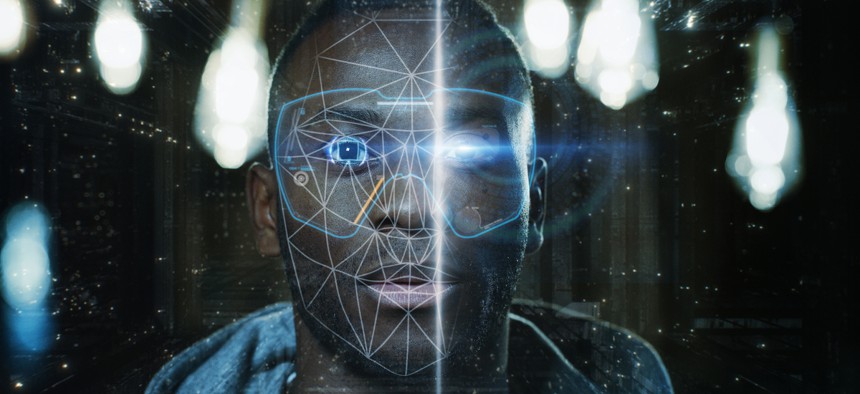Lawmakers Introduce Bill to Ban Federal Use of Facial Recognition Tech

HQuality/Shutterstock.com
If passed, federal agencies would not be able to run, fund, purchase or otherwise use data from facial biometric systems without congressional authorization.
A bicameral group of Democratic lawmakers introduced legislation to ban the use of facial recognition technologies by all federal agencies without explicit authorization from Congress.
On Thursday, Sens. Edward Markey, D-Mass., and Jeff Merkley, D-Ore., and Reps. Pramila Jayapal, D-Wash., and Ayanna Pressley, D-Mass., introduced the Facial Recognition and Biometric Technology Moratorium Act of 2020.
The bill’s long title offers a fuller picture of the lawmakers’ intent: To prohibit biometric surveillance by the federal government without explicit statutory authorization and to withhold certain federal public safety grants from state and local governments that engage in biometric surveillance.
For federal agencies, that would mean a blanket ban on the use of “any biometric surveillance system” that uses facial recognition technology or “information derived from a biometric surveillance system operated by another entity,” including another authorized federal agency or through a contracted vendor.
The bill would prevent any federal funds from being allocated to “the purchase or use” of biometric surveillance systems, and ensure agencies can’t use nondiscretionary funds for that purpose, as well. The federal government would also be prohibited from giving grant money to any state or local law enforcement agency unless that organization is governed by a similar statute.
In addition, the bill explicitly prevents any information obtained in violation of this law from being used in judicial proceedings.
The legislation would also give people the right to sue federal agencies who violate the statute. Any federal official involved in such wrongdoing “may be subject to retraining, suspension, termination or any other penalty, as determined in an appropriate tribunal.”
The legislation would be the first comprehensive federal ban on facial recognition use in government and would have wide-ranging effects on several agency programs, such as those run by Customs and Border Protection—which runs its own biometric program—and Immigration and Customs Enforcement—which uses third-party services.
The language does carve out exceptions for “activities explicitly authorized by an act of Congress,” though those acts would need to include specifics on who can use the technology; the type of biometrics authorized to be collected; how that data can be stored, collected and shared; auditing procedures to detect biases; protections for due process; and lists of prohibited uses.
While CBP’s Entry/Exit program has a congressional mandate to use biometrics, it is unclear whether these existing programs would need additional authorizations under this legislation. Representatives for the lawmakers did not respond to questions about ongoing programs.
“Facial recognition technology doesn’t just pose a grave threat to our privacy, it physically endangers Black Americans and other minority populations in our country,” Markey said in a statement. “As we work to dismantle the systematic racism that permeates every part of our society, we can’t ignore the harms that these technologies present. … In this moment, the only responsible thing to do is to prohibit government and law enforcement from using these surveillance mechanisms.”
The lawmakers introduced the bill one day after widespread reports of the nation’s first known instance of a person being wrongly accused of a crime due to faulty facial recognition technology. Robert Williams, a 42-year-old Black man from Detroit, was arrested in January after a facial recognition algorithm matched his driver’s license photo to an image taken from surveillance footage of a person shoplifting. Williams was later cleared of all charges.
“Facial recognition technology is fundamentally flawed, systemically biased, and has no place in our society,” Pressley said. “This bill would boldly affirm the civil liberties of every person in this country and protect their right to live free of unjust and discriminatory surveillance by government and law enforcement.”
The legislation joins other recent calls to stem the use of facial recognition by law enforcement, including a comprehensive policing reform bill that would require the use of body cameras but prohibit incorporating real-time facial recognition.
The new legislation also follows statements from leading tech companies—including Google, Amazon, IBM and Microsoft—promising to halt their development and sale of facial recognition technologies to law enforcement agencies.
“For years, I have called on companies like Amazon to stop selling facial recognition technology that has not only been invasive, inaccurate and unregulated but has also been unapologetically weaponized by law enforcement against Black people across this country for far too long,” Jayapal said in the statement. “Our legislation will not only protect civil liberties but it will aggressively fight back against racial injustice by stopping federal entities from using facial recognition tools and stripping support for state and local law enforcement departments that use biometric technology.”
The statement notes the legislation has been endorsed by “the ACLU, Electronic Frontier Foundation, Fight for the Future, Color of Change, MediaJustice, Electronic Privacy Information Center, Free Press, Jewish Voice for Peace, MPower Change, the Athena Coalition, Project on Government Oversight, Georgetown University Law Center’s Center on Privacy and Technology, and New America’s Open Technology Institute.”






